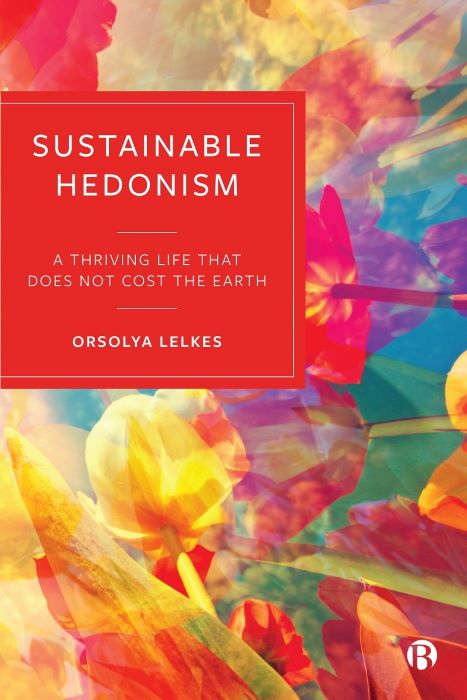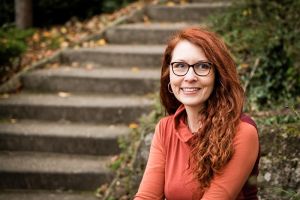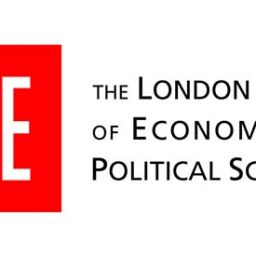Sustainable Hedonism book aims to break down convictions
Article written by the Business Spirit Platform, originally published in the “Make change happen” issue of Profit with Purpose Magazine, Winter 2021/22

How can we create a thriving life for us all that does not come at the price of ecological destruction?
The Sustainable Hedonism book calls us to explore our collective and personal convictions about success and good life.
Author Orsolya Lelkes is an independent scholar, psychological counsellor, and former Deputy Director at the European Centre for Social Welfare Policy and Research in Vienna.
She challenges the mainstream worldview, rooted in economics, that equates happiness with pleasure and encourages greed, materialism, egoism and disconnection.
Drawing on science and ancient Greek philosophers, the author details how we can cultivate our skills for enjoying life without harming ourselves or others and live an autonomous, creative, and connected life.
Complementary to our intellectual understanding, the experiential method of role-playing and theatre can powerfully facilitate the exploration of the inner drivers and hindrances of a thriving life.
Jonathan Dawson, Head of Economics at Schumacher College expressed his thoughts about the book in a review:
“Beyond the empty, sterile promises of consumerism, there is a place rich in meaningful engagement with ourselves, others and the more than human world. A rediscovery of our bodies – specifically in the form of theatre and role-play – provides a powerful channel for this re-awakening. This is the territory that Orsolya Lelkes so skilfully and powerfully explores, helping us to re-engage with the power of embodiment.”
The author shares her thoughts about writing the book and how to utilize the knowledge you can find in it:
“I wanted to have the freedom to write about something that I feel relevant, and I’m passionate about.
When I started the book, I had two central pillars in my life: one was researching social science, social justice and happiness, and the other was working with individuals as a coach and group facilitator.
While I was involved with these topics, I felt that there was a wall between the two sides of research and people looking for better ways to live their lives.
I also wanted to break down this wall by looking at how we can find a way to fulfil our dreams without destroying our planet.
By putting sustainability and hedonism together, I meant to provoke a conversation.
We usually don’t see sustainability as the freedom to enjoy life but rather as restrictions and limitations to what we can do.
For me, it is also about that we can learn to enjoy life more and be conscious about our environment at the same time.
One of my goals with the book was to open up the conversation about what we need for success and how we can redefine and refine our narratives about being successful and happy in a capitalist economy that is basically built on continuous consumption.
When you learn about the economy in education, they will teach you that human beings are egoistic, pleasure-seeking, and competitive.
This is just one example of the unquestioned beliefs in our economic system that drive a self-fulfilling prophesy that we are becoming more egoistic, pleasure-seeking, and competitive.
One of the biggest challenges in adopting a sustainable lifestyle is that it sounds like an invitation that says you need to lose many things from your comfort to join, and who wants to do that, really?
I believe that our pleasure-seeking side and responsible side shouldn’t be in conflict when it comes to sustainability.
Our lives are strongly shaped by the stories we tell ourselves, both individually and collectively. We are often unaware of our potential to transform them and take many things for granted.
Another narrative rarely questioned in our society is that we need many material-based things in our lives to be happy.
If you think about building a reputation or exhibiting power, you show that through materialistic elements. We are trained and seduced to think of success primarily in material terms, money, consumption, things we own, or external power and reputation.
This is not optimal for a happy life. It is not a resilient strategy – as it is vulnerable and exposed to the mercy of others or of external fortune. But actually, some research found that these people with a materialistic focus are less happy and even less resilient. It is interesting to consider that what we value as a society and what is good for us on an individual level are not the same thing.
I hope this book will become more than just intellectual knowledge and invite people to explore and experiment with how they live, considering some of the content I wrote.
I’d like to invite pioneers, innovators and critical thinkers – who do not simply want to point the finger at others but seek their own role in contributing to a solution to the failures they witness.
The last chapter is fundamentally about allowing ourselves to live with a playful, curious and friendly spirit.
I don’t want to be the clever person who tells you what to do.
Instead, I would like to encourage people to discover more about their options for living a happy and sustainable life.“





